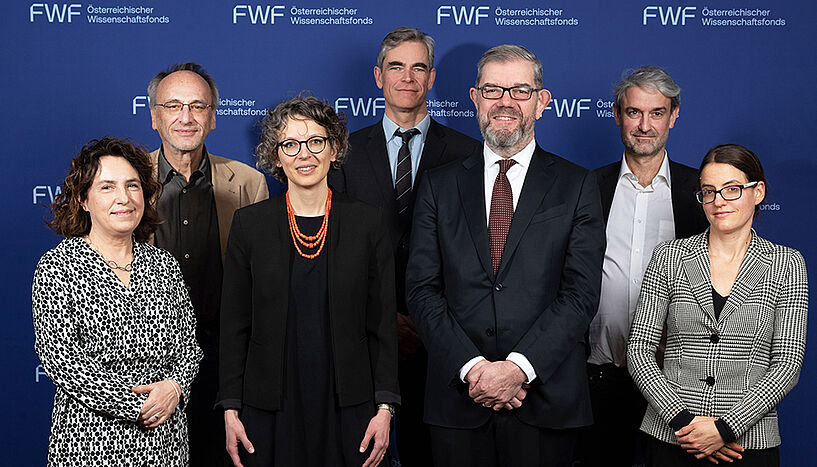Understanding and overcoming the crisis of the knowledge
14. August 2023Cluster of Excellence Knowledge in Crisis / Wissen in der Krise:
Under this title, an interdisciplinary team led by Tim Crane from the Central European University (CEU) addresses the threats to the knowledge claims due to rapidly advancing technological developments. They seek to find new pathways of knowledge in the 21st century. The philosophers Paulina Sliwa, Bernhard Schmid and Max Kölbel represent the University of Vienna in the coordination team of the research network, which is funded as part of the excellence initiative excellent=austria.
Since the emergence of the Internet, we are faced with a flood of information and it is not easy to keep an overview of all this information. "We are faced with a crisis of knowledge. The technological progress threatens our knowledge claims and the flood of information on the Internet challenges our ability to distinguish between truth and untruth," says Paulina Sliwa, professor at the Faculty of Philosophy and Education at the University of Vienna and member on the Board of Directors of the new Cluster of Excellence Knowledge in Crisis / Wissen in der Krise, which will be launched in the autumn of 2023. This crisis is both a theoretical and a practical crisis, which has an effect on our way of life and our fundamental understanding of the world.
"This crisis raises profound philosophical questions about knowledge, truth, science, ethics and politics and, eventually, also about our relationship towards reality," says Sliwa. The Central European University and the University of Vienna as well as the University of Graz and the University of Salzburg are involved in the new inter-university Cluster of Excellence, which aims to understand this pressure on knowledge in all its facets to find strategies to respond to it and also to “rethink our attitude towards knowledge”.
Using questions to tackle the crisis of knowledge
To accomplish this, the academics ask the following philosophical questions: What is the connection between truth and knowledge? What makes a person knowledgeable and how is knowledge created, preserved, shared? Does science have a special authority in this context and if yes, why?
These theoretical questions pose practical challenges for the researchers: "What can we, as philosophers, do to overcome the crisis of knowledge? How can we stop the steady erosion of knowledge in our society? How can we restore the confidence in science? What value should academic findings have in our democratic society?” These are only some of the most important questions that Paulina Sliwa mentions in this context.
"In a world, in which everyone has their ‘own facts’, about how the world works and what happened in history, democratic coexistence is no longer possible." Paulina Sliwa
The crisis of knowledge is a social phenomenon that affects us all. Therefore, it is all the more important to study it comprehensively: "We are all affected when the confidence in academic findings is lost and the idea of expert knowledge is questioned," emphasises the philosopher.
What is the excellence initiative?
With the excellence initiative excellent=austria, Austria is opening a new chapter in basic research: Five clusters of excellence will launch cooperative projects at an unprecedented dimension at eleven locations from the summer of 2023 onwards. Researchers involved in the initiative have the opportunity to contribute outstanding research achievements in individual fields as well as in interdisciplinary areas and to firmly position this field of research at the highest international level in the long term in Austria. The University of Vienna is involved in all five Clusters of Excellence.
A new dimension of networking
Academics from the Central European University, the University of Vienna, the University of Graz and the University of Salzburg cooperate in the Cluster: “This cooperation structure is particularly exciting: The Cluster of Excellence enables us to consolidate different fields of philosophy, which otherwise work independently of each other. Our team comprises colleagues who conduct research in the areas of epistemology, philosophy of mind, ethics and political philosophy, philosophy of science, philosophy of language, philosophy of technology and philosophy of education. At the same time, it establishes links in Austrian philosophy in an unprecedented way," says Sliwa.
In addition to Paulina Sliwa, Hans Bernhard Schmid and Max Kölbel from the Department of Philosophy represent the University of Vienna in the coordination team of the new cluster (Board of Directors); the research network is led by Tim Crane from the CEU. Other academics from the University of Vienna are involved in the major project as key researchers: Mark Coeckelbergh, Herwig Grimm, Angela Kallhoff, Tarja Knuuttila, Franz-Markus Peschl, Benjamin Schnieder und Felix Pinkert.
Board of Directors and participating research institutions
- Tim Crane (Director of Research, Central European University)
- Marian David (University of Graz)
- Katalin Farkas (Central European University)
- Max Kölbel (University of Vienna)
- Hans Bernhard Schmid (University of Vienna)
- Paulina Sliwa (University of Vienna)
- Charlotte Werndl (University of Salzburg)
Austrian Science Fund (FWF) funding amount: 8.9 million euros
About Paulina Sliwa
Paulina Sliwa has been Professor of Moral and Political Philosophy at the Faculty of Philosophy and Education of the University of Vienna since September 2021. She has held positions at the Massachusetts Institute of Technology (MIT) and the University of Cambridge. Her research focuses on the fields of moral psychology, moral epistemology and feminist philosophy. In her research, Sliwa tries to understand the practices that are at the centre of our moral lives. Find out more in the podcast "Es gibt kein Google für Moral" (Rudolphina, January 2022)


